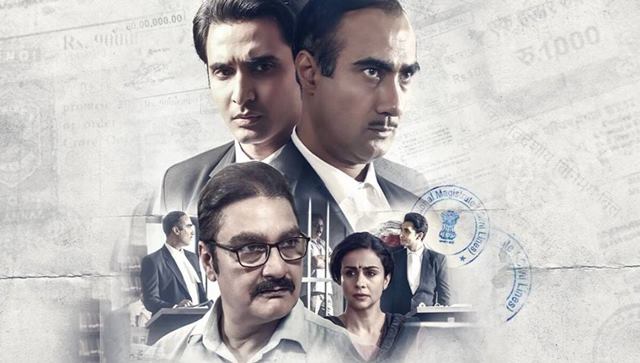Language: Hindi Few actors can play an unassuming, middle-class everyman as well as
Vinay Pathak (whose skills have been sadly underused in the past decade), and this is emphasized by the opening scenes of the new film 420 IPC. Chartered accountant Bansi Keswani (Pathak) is with one of his higher-profile clients, the deputy director of the Mumbai Metropolitan Region Development Authority (MMRDA). “There should be different rules for the family members of government servants, no?” says this official during a chat about tax filing; Keswani responds with a quarter-smile and a politely unenthusiastic “Jee” – followed by a bob of the head and a “Main chaloon?” (“I’ll leave now?”) An honest CA made uncomfortable by suggestions of power-mongering in high places, and by the entitlement of privileged people? Not long after this, we see Keswani disapprovingly muttering “Shakkar mein bhi paise bachate hain” (“They save money even on sugar”) after sipping bland tea served in an office that he knows conducts big financial transactions. At this point the line between the big-shots who pull the strings and the worker ants who serve appears to be fairly well-defined. And so, when Bansi and his wife Pooja (Gul Panag, in the unglamorous avatar of some of her early films like Dor and Manorama Six Feet Under) find CBI officials raiding their house, the sense of violation is palpable. “Sir, main karze mein dooba hua aadmi hoon, main EMI nahin bhar paaya hoon,” Bansi protests as the officials tear his house apart looking for evidence of financial scams. We don’t know many details yet, but the sight of a middle-class family under siege can raise the hackles of a viewer who knows how vulnerable such underdogs are to miscarriage of justice. Also read:
The Sameer Nair interview | Dubbed and subtitled content have always been there but adaptations make global shows Indian Though Keswani is cleared of suspicion, a couple of months later he finds himself in trouble again when forged cheques adding up to 1.5 crore rupees are stolen from the office of another of his clients. This time matters are serious enough for him to be taken into judicial custody, and courtroom proceedings begin. **** Some ambiguity about characters and incidents is built into this scenario, and 420 IPC makes the most of this uncertainty. While Pathak is ostensibly playing a Decent Man here, he is also a good enough actor to suggest sinister currents below a quiet surface, and he has done villainous or sleazy roles before – so a small question mark hangs over this persecuted-man narrative. What if…? Could it be…? 420 IPC is written and directed by Manish Gupta, who also wrote the 2019 film Section 375, about the legal proceedings surrounding a rape allegation. Both films have a comparable arc: an accusation or an arrest is made, we are privy to different versions of what might have transpired, new information comes in, people’s motivations and interrelationships are seen in a fresh light, there are little twists. Lawyers bicker, discuss the workings of the legal system. Section 375 involved a courtroom faceoff between an experienced senior lawyer (played by Akshaye Khanna, all eyebrows and smirk) and an idealistic younger one (
Richa Chaddha ), with the former patronisingly imparting life-and-law lessons as the trial proceeds. Initially, it seems like 420 IPC will take the same route: in one corner we have the seasoned Parsi prosecutor Jamshed Ji (
Ranvir Shorey ), in the other the twenty-something defence attorney Birbal (Rohan Vinod Mehra). Shorey (who, in what seems another cinematic lifetime now, worked wonderfully well with Vinay Pathak in such films as Bheja Fry and Mithya) has played some unlikable characters recently, and here he is now, hair slicked back, giving his opposite number a smug once-over; meanwhile, Mehra (son of the late Vinod Mehra who was one of the most genial performers of his era) has a fresh-faced earnestness. It seems likely that for much of the film’s duration, the cards will be stacked in the prosecutor’s favour.
Jai Arjun Singh is the author of The World of Hrishikesh Mukherjee, Jaane bhi do Yaaro: Seriously Funny Since 1983, and The Popcorn Essayists: What Movies do to Writers. Follow more of his writing on his blog, or on Twitter.


)
)
)
)
)
)
)
)
)



